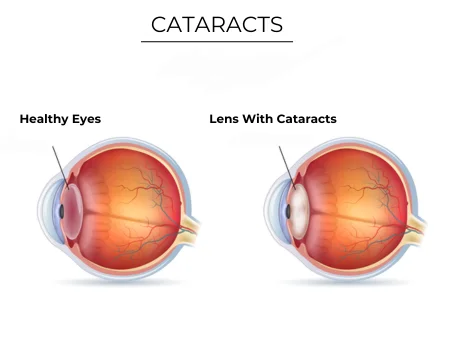

Why Choose Spectra Eye For Cataract Surgery In Mauritius?
Spectra Eye provides some of the top eye care services in Mauritius using cutting-edge diagnostic equipment and advanced surgical tools. Trained specialists work throughout the year to deliver full eye care services. These range from basic procedures to complicated surgeries, all done with attention and expertise. People looking for top-notch cataract treatment in Mauritius can depend on the clinic’s modern facilities and skilled surgeons to offer safe, efficient, and personalized care.

STATE OF THE ART FACILITIES

INSURANCE ACCEPTED

ONE DAY PROCEDURES

EXPERIENCE OF MANY SURGERIES

Multiple Centers across the Globe
Get Consultation with Cataract Surgery Expert
What Is Cataract?
Cataracts happen when the natural lens in your eye gets cloudy and stiff, making your vision blurry or darker. This can make daily tasks harder to do. While cataracts are seen in older people, they can also appear in babies or younger folks. To confirm if you have a cataract, doctors need to do a full eye checkup. Cataracts cannot heal themselves, and surgery is the only way to treat them. Thinking about getting cataract surgery in Mauritius? The skilled team at Spectra Eye can help you have a smooth and safe procedure.
Types of Cataract
Age-Related Cataracts
Aging can cloud the lens in your eye. This common cataract often connects to smoking too much alcohol, or health issues such as diabetes.
Cortical Cataracts
These cataracts grow in the outer layer of the lens called the cortex. They appear as wedge-shaped cloudy areas stretching from the edges of the lens toward its center.
Posterior Subcapsular Cataracts
These form at the back of the lens just under its capsule. They often make it harder to read and cause glare or light halos in bright environments.
Congenital Cataracts
Genetic issues or infections during pregnancy often cause these cataracts, which are either present at birth or emerge in childhood.
Traumatic Cataracts
An eye injury can lead to these cataracts. They might form right after the trauma or take years to show up.
Secondary Cataracts
These cataracts may appear after eye operations like glaucoma surgery or because of illnesses like diabetes.
Radiation Cataracts
Exposure to ionizing radiation causes these cataracts, which sometimes develop in people getting specific cancer treatments.
Causes of Cataract
Genetics: Having a family history of cataracts raises your chances of getting them.
UV Radiation: Spending too much time in sunlight or under UV rays harms the eye's lens.
Medical Conditions: Conditions like diabetes or high blood pressure speed up the growth of cataracts.
Medications: Certain medications, especially long-term steroid use.
Unhealthy Habits: Smoking or drinking a lot of alcohol can lead to a higher chance of developing cataracts.
Poor Nutrition: Eating food that lacks important vitamins and antioxidants weakens the lens and makes it prone to damage.

Symptoms of Cataract
Cataracts tend to form, and because they are often linked to aging, many confuse them with typical signs of getting older. The condition does not hurt, but it can make vision more and more blurry or cloudy over time. Symptoms can go from minor vision problems to serious trouble with daily activities.
- Cloudy or blurry eyesight
- Struggling to see at night
- Bright lights or glare can feel uncomfortable, especially during night-time driving
- Needing to update glasses or contact lens prescriptions often
- Colors appear faded or tinted yellow
- Less sharpness or lower contrast in colors
- Double Vision

Advantages of the latest Cataract Technology
The latest methods and tools in cataract surgery have greatly boosted safety and enhanced visual results. Below are some main advantages:
Sharp Vision: New technology helps people see more clearly, giving a big boost to how they view the world and making daily life more comfortable.
Fast Healing: Small and precise techniques help people recover faster, letting them get back to their regular routines earlier.
Less Dependence On Glasses: Today’s intraocular lenses (IOLs) often cut down or remove the need to use glasses after surgery, whether it’s for far or near sight.
Improved Safety: Modern surgical tools and safety features lower the chances of things going wrong during the operation.
Comfortable Experience: Better procedures lead to less pain both while the surgery is being done and after it’s over.
Treatment procedure of cataract
Mauritius offers different types of cataract surgeries to help people see.
Phacoemulsification
This is the most popular way to remove cataracts. Surgeons use ultrasound waves to break apart the cloudy lens and take it out through a small cut. To bring back clear sight, they put in a new artificial lens known as an IOL.
Extracapsular Cataract Extraction (ECCE)
This older technique works well for removing cataracts. Surgeons take out the cloudy lens in a single piece through a bigger opening. They choose this when the cataract is too thick to handle with phacoemulsification.
Intraocular Lens (IOL) Options
Patients have multiple IOL options based on their vision requirements and daily activities:
Monofocal IOL
This lens gives sharp vision at one fixed distance for seeing far. You might still need reading glasses for close-up tasks.
Multifocal IOL
This type of lens has multiple focus points. It helps you see at different ranges and may lessen your need for glasses.
Toric IOL
Designed to fix astigmatism, this lens improves vision for those with this specific eye issue.
Laser-Assisted Cataract Surgery
Laser-assisted cataract surgery uses advanced femtosecond laser technology. It offers better accuracy and might help in speeding up recovery.
Post-Treatment Care After Cataract Surgery
Patients should stick to these care tips to recover after their procedure.
- Follow the instructions for using your eye drops.
- Do not rub or put pressure on your eye.
- Keep your eyes safe from dust and water.
- Put on sunglasses when outside to shield against UV rays.
- Stay away from heavy physical activities during the initial weeks.
- Make sure to go to every follow-up appointment with your doctor.
Factors Affecting Cataract Eye Surgery Cost In Mauritius
The cost of cataract surgery in Mauritius is influenced by various elements, including:
- The kind of technology used (standard or laser-assisted)
- The necessary diagnostic tests
- The selected hospital or clinic
- The type of intraocular lens chosen
- Fees for the surgeon and anaesthetist
- Any other eye-related conditions
- Follow-up visits and postoperative care
To get a clear idea of the costs, you can call our patient care team at +230 5251 7100 to receive tailored advice. For an accurate cost estimate, you can contact our patient care team at +230 5251 7100 for personalized guidance.
Book an Appointment
TESTIMONIALS
Frequently Asked Questions About Cataract
A. There are three main methods for cataract surgery: Phacoemulsification (Phaco), Extracapsular Cataract Extraction (ECCE), and Intracapsular Cataract Extraction (ICCE). Among these, Phaco is the most common and advanced.
A. Cataract surgery is typically not painful. Local anesthesia is used to numb the eye, and any discomfort during the procedure is minimal. Post-surgery, patients may experience mild irritation.
A. Cataract surgery is a common and generally safe procedure. It is considered serious in terms of the potential impact on vision but is routinely performed with a high success rate.
A. You should try to avoid blinking during cataract surgery, as it can disrupt the procedure. Surgeons use instruments to keep the eye open and steady throughout the surgery.
A. Some individuals with underlying eye conditions, severe medical problems, or unrealistic expectations may not be suitable candidates for cataract surgery. A comprehensive eye evaluation determines eligibility.
A. Phacoemulsification, or "Phaco," is the most common and advanced cataract surgery method. It involves small incisions, quicker recovery, and improved outcomes, making it the preferred choice for most patients.
